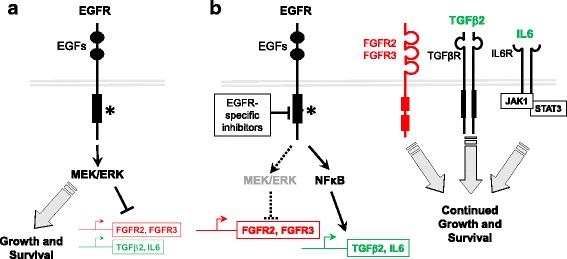Fig. 1.

Rapidly induced cell autonomous bypass signaling. a Using EGFR mutated lung tumors as an example, oncogenic EGFR signals through the MEK/ERK pathway to drive growth and survival, but also suppresses FGFR2, FGFR3 and TGFβ2 expression. b Upon treatment with EGFR-specific TKIs, MEK/ERK activity is inhibited to reduce growth and survival signaling, but also de-represses alternative bypass growth and survival pathways including FGFR2, FGFR3, TGFβ2 and IL6. EGFR TKIs increase NFκB pathway activity which may drive expression of IL6 [36]. These transcriptional changes result in establishment of emergent autocrine loops to ensure the continued growth and survival of the tumor in the presence of an EGFR inhibitor
